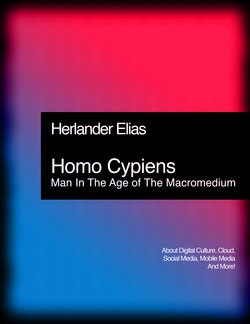Читать книгу Homo Cypiens - Herlander Elias - Страница 25
На сайте Литреса книга снята с продажи.
7.The Macro-medium Era
ОглавлениеAs we saw before, it is above all in digital media, and not only, but in particular, that images are transformed into connection-images. Contributing to the evolution of this great medium, which is digital, are the connection-images that make use of their scale of interconnection. In this context, and also respecting the tyranny of the economy of the immediate, mass media and digital media merge into a multi-macro multiform that all agglutinates in a single matrix. That is to say, we currently only use a medium, a single medium of communication, and regardless of its formatting, in the end we notice that elements such as "linearity" are left behind to move to a time of "configurations". After all, the macro-medium is this interconnecting medium of multiple configurations. We have many entry points to deal with their narratives, characters, protagonists and antagonists. In this matrix medium everything can be translated from / to any image. The macro-medium is a wise image and a new half-image. Furthermore, it is the first medium that extinguishes the difference between medium and content, media and formats. The macro-medium is almost self-referential as it has its own fauna, flora and atmosphere. Metaphors aside, the macro-medium is simply the new version of what were the Radio, TV, Press, Net and Cloud. The simplification and tyranny of the immediate and minimalist, plus the liberal economy, were intended to create a construct that would simplify the connection between companies, institutions and brands, reaching directly the consumers. And they did it.
To speak in macro-medium is also a contradiction. Ultimately, in the era of macro-medium eras do not matter. Today, yesterday, in the 20thcentury, before that, what matters if everything is now on YouTube? Everything that was off as an offline image was imported into the macro-medium. This means that even the pre-media past is not away from mediation and digitization. The tendency is for the media to reduce themselves to a controlled minimalism of a single medium, acquiring a gigantic scale. Given the amount of connection-images that are imported into the record of this medium, it is odd how some things are not found within it. But the "natural" tendency is for everything to stay within the same macro-medium. The scale and reach are impressive.
One of the reasons why all connection-images, events, and cultural production are passed on to the great medium is because there is a concern to predict the future, as if this fact would draw us away from a catastrophe and bring us closer to a happy and lucky future. The more elements captured by the sub-media (mass media and social media, for example), the more power the macro-medium holds. And, little by little, or rather, very gradually, this medium grows and becomes a mega-archive through which it is possible to predict the future, because there is huge amount of information and knowledge of the past and the present that allows us to create anticipation models. This is called "futurocracy," that is, when our power lies in the way we make use of information in order to have some profitable applicability now or in the future. The same is to say that the images and their connections in this medium function as a sort of temporal device, a construct of change of reality, because the present is manipulated based on the past, and the future is manipulated based on the present.
The macro-medium abolishes the fact that there are classical notions of time, such as yesterday, now and tomorrow. Past centuries have seen a thread ball of antiquity that can be dismantled at our convenience. Everything is archived. All past eras are reduced to titles, labels, information entry points in the large macro-medium file. It is as if there is only this macro-medium and time is not useful to record the past as it happens in a museum. What is happening now is that things of the past can be imported into the present or into the future to please the conveniences of a "future" elite concerned with success.
Precisely because one lives in a "futurocratic" system and in an economy of the immediate, what matters is to have maximum power over works, content, information and knowledge, right now, so that utopian futures can be projected away from any rivalry with the reality. The great fear of a society based on instantaneous power over reality is that it will not have more power, that it will lose its ability to act on the present and the future. The fear of the futurocratic is that the power (kratos) ceases to be based on the images of the future that connect us to the present. Those who control these images control reality. Just as in Orwell's speech, whoever controls the past controls the future, and whoever controls the future controls the past. So, in fact, how can the future be ours if we do not control our past? Everything we do is recorded in the macro-medium, it cannot be deleted, but it can be "found" by third parties. Can we say that the future belongs to us? Or rather, did the future ever belong to us?
